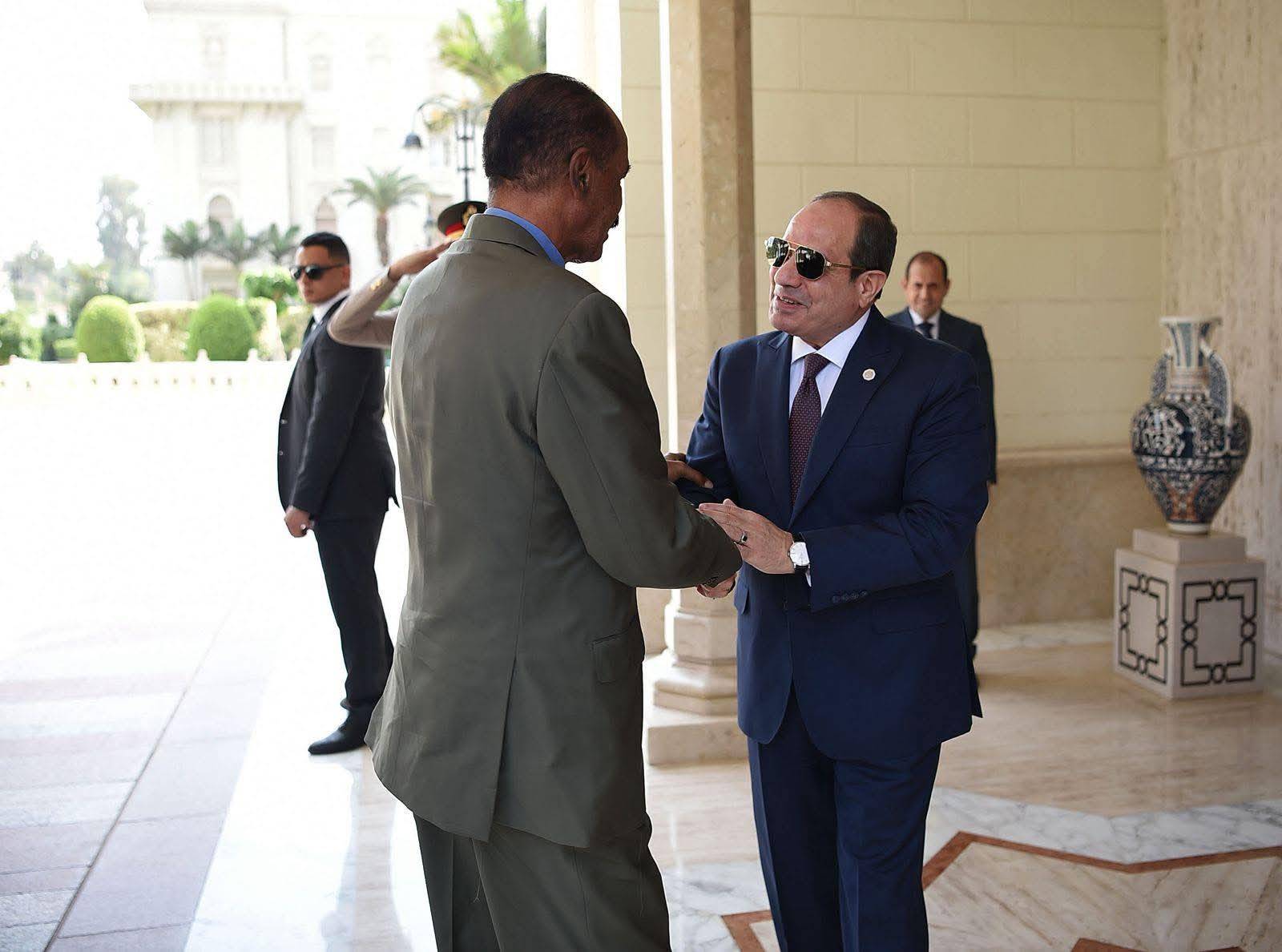Cairo-Asmara alliance sends a strong message to Ethiopia's regional ambitions
Sisi to Afwerki: Coordination must be intensified to ensure Red Sea security Egyptian President Abdel Fattah al-Sisi received his Eritrean counterpart Isaias Afwerki in Cairo on Thursday (Egyptian Presidency) Alliance of Necessity
Egyptian President Abdel Fattah al-Sisi received his Eritrean counterpart Isaias Afwerki in Cairo on Thursday (Egyptian Presidency) Alliance of NecessityCairo – Eritrean President Isaias Afwerki began a visit to Egypt on Thursday, coinciding with escalating tensions between Asmara and Addis Ababa. This comes amidst Ethiopia's insistence on gaining access to the Red Sea, at a time when relations between Asmara and Cairo are evolving from situational coordination on certain issues to an alliance against Ethiopia's ambitions in the Horn of Africa.
Egypt considers itself deeply concerned with the escalating dispute between Eritrea and Ethiopia, which it fears could spiral out of control. Cairo has strong reservations about Addis Ababa gaining access to the Red Sea, viewing it as a threat to its vital interests in the region. Observers believe that Egypt is once again demonstrating that its stance towards Ethiopia is escalating, and that the matter is not limited to the Grand Ethiopian Renaissance Dam (GERD) crisis and Addis Ababa's imposition of its choices without coordination or arrangement with the Nile Basin partners. Rather, it extends to building regional alliances (with Eritrea and Somalia) to limit Ethiopia's growing role in the Horn of Africa.
Egyptian President Abdel Fattah al-Sisi received his Eritrean counterpart, in the presence of Egyptian Foreign and Immigration Minister Badr Abdel-Aty and Eritrean Foreign Minister Osman Saleh Mohammed.
According to Egyptian presidential spokesperson Mohamed El-Shenawy, the two presidents discussed regional developments, with Sisi affirming Egypt's unwavering commitment to supporting Eritrea's sovereignty and territorial integrity.
For his part, Afwerki expressed his deep appreciation for Egypt's role, under the leadership of President Sisi, in consolidating stability and advancing development efforts in the Horn of Africa and East Africa. He welcomed expanding economic cooperation with Egypt and strengthening bilateral coordination on international and regional issues of common interest.
The Egyptian presidential spokesperson explained that the meeting included an emphasis on the importance of strengthening cooperation to ensure the security of the Red Sea and to prevent any disruption to navigation in this vital waterway. Sisi stressed the need to intensify coordination between Egypt and Eritrea, as well as with other Arab and African coastal states, in order to contribute to consolidating security and stability in this important region.
Observers believe that the Eritrean president's visit to Cairo, which is likely to last several days, aims to reach understandings on ways to confront Ethiopian threats.
These observers do not rule out the possibility that Egypt might provide military support to Eritrea, as it did with Somalia previously, thus breaking the principle of non-intervention. Observers indicate that the current Eritrean-Egyptian move will focus on garnering African and international support to dissuade Ethiopia from any potential adventure.
Ethiopian Prime Minister Abiy Ahmed recently affirmed that his country's acquisition of a seaport has become "inevitable."
Ahmed stressed that access to the sea is a “legal, historical, geographical, and economic issue that must be dealt with calmly,” without ruling out the option of confrontation, stating that Ethiopia “does not seek war, but is capable of it if it is imposed upon it.”
Since Eritrea’s independence in 1993, Ethiopia lost its only access to the sea through the ports of Assab and Massawa, becoming a landlocked country.
With the outbreak of war between the two countries in 1998, Asmara closed the ports to Addis Ababa, forcing Ethiopia to rely almost entirely on the port of Djibouti, through which more than 90 percent of its foreign trade passes. Ethiopia has never accepted the idea that it has lost its access to the sea, and today, having succeeded in turning the Grand Ethiopian Renaissance Dam (GERD) into a reality, it aspires to achieve its ambition of regaining a presence on the Red Sea.
Observers believe that Ethiopia seems prepared to go to any lengths to exert pressure to get what it wants, even if it means engaging in a confrontation with Eritrea.
Faced with this situation, Asmara finds itself on the defensive, requiring it to garner support from the other Red Sea littoral states, foremost among them Egypt, which has no interest in the entry of a new player, particularly Ethiopia, and the resulting shift in the existing balance of power in the region.
Egyptian Foreign Minister Badr Abdel-Aty previously affirmed this during a meeting with the European Union's Special Envoy for the Horn of Africa, Annette Weber, on the sidelines of the fifth edition of the Aswan Forum for Sustainable Peace and Development. He stated that "the governance of the Red Sea remains an inherent and exclusive matter for the littoral states, as they are responsible for maintaining its security and stability, ensuring the sustainability of its resources, and promoting the shared interests of their peoples, thus enshrining the principle of regional ownership in managing its affairs." Abiy Ahmed and Afwerki were close allies from 2018 to 2022, but their relationship deteriorated following the war in Tigray and Ethiopia's renewed efforts to secure access to the sea.
Ethiopian leaders publicly questioned the legitimacy of Eritrea's 1993 independence, and the two governments exchanged accusations of aggression and bad faith.





